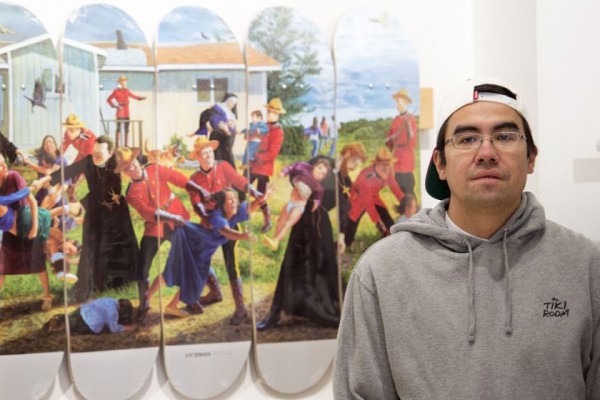Debriefing Elsipogtog: the anatomy of a struggle
When is a journalist not a journalist? According to CBC New Brunswick’s Information Morning host Terry Seguin, and media guests Dan Leger and Philip Lee, it is when the journalist becomes an activist. Calling freelance journalist Miles Howe a mere blogger, they questioned his credentials as a journalist. Leger even called Howe a “hot-headed fanatic” for his opposition to fracking at Elsipogtog, New Brunswick. Howe, whose stories and blogs appear regularly on the Halifax Media Co-op and elsewhere, was arrested in 2013 at least three times by the RCMP near Rexton, N.B. — basically for being a photo-journalist. His camera and computer were seized by the police. Howe had to resort to crowd-funding to raise money to replace these valuable tools of his trade.
But Miles Howe has the last laugh. He just published his first book, Debriefing Elsipogtog: the Anatomy of a Struggle, which provides insight and service to the cause of Aboriginal people and which his detractors cannot erase.
Miles Howe fits into a time-honoured tradition of citizen-journalist — one epitomized by George Orwell, who noted, “Journalism is printing what someone else does not want printed: everything else is public relations.” Orwell, a British journalist and socialist, volunteered to fight on the Republican side in the Spanish Civil War and wrote about it.
Miles Howe broke the story about fracking and showed how far the New Brunswick government, the US company SWN Resources and the police were willing to go to open the province to fracking. Howe also demonstrated the commitment of Aboriginal people, and some white settler communities in the poorest province in Canada, to fight the destruction of their land and water.
Howe closely examines the mythical tradeoff between environmental protection and jobs. He looks at the toll fracking takes — from the chemicals used in the fracking process to the contamination of aquifers, to damage to wells, to possible earthquakes.
Howe also writes about the history and politics of white, settler New Brunswick and the seesaw of Tory and Liberal governments. He makes no bones about how the the Irvings control the resource and the media sectors.
The book notes that six of the ten poorest postal codes in Canada are in New Brunswick First Nations’ communities. Howe charts the largely untold history of First Nations people in New Brunswick and respect-fully weighs the politics and actions of the Assembly of First Nations New Brunswick, the Elsipogtog First Nation and the Mi’kmaq Warrior Society.
The real villains in the book include the RCMP who sparked violence and made scores of brutal arrests at the protests.
Harper’s government views First Nations peoples a threat, writes Benjamin Shingler of the Canadian Press: “Federal officials closely tracked the fallout of an RCMP raid on a First Nations protest against shale-gas exploration in New Brunswick, at one point raising concerns it could spawn another countrywide movement like Idle No More. Documents obtained under access-to-information legislation reveal a lengthy email chain last fall monitoring events related to a blockade near Rexton, N.B.”
In fact, the emails bounced from the Privy Council Office (which serves Harper and the Cabinet), to the Government Operations Centre (an arm of Public Safety Canada). According to Shingler, the Government Operations Centre website boasts it offers an “All-hazards integrated federal emergency response to events,” and emailed out daily reports which dealt with planned protests nationwide.
This brings me to Bill C-51, the new Anti-Terrorism Act. It directly threatens Aboriginal people and their supporters. The law sets a new standard for arrest and detention. If the police have a reason to suspect that someone or a group may commit a terrorist act, the police can arrest and detain them. They can act on a mere suspicion that an arrest is likely to prevent any terrorist activity.
Howe’s book shows how the Aboriginal community has fought back against colonial encroachment and oppression — I’m sure the Harper government is paying attention.
Judy Haiven is on the steering committee of Equity Watch, a Halifax-based organization which fights bullying, racism and discrimination in the workplace.
This article appeared in the September/October 2015 issue of Canadian Dimension (The Harper Demolition).










